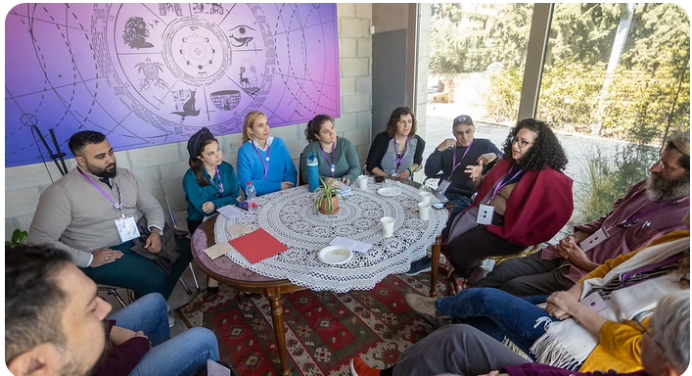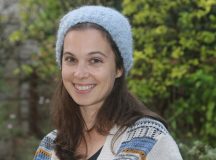Dear Diary,
I sit here writing in my sukkah, unable to focus as we anxiously await the return of the hostages.
I remember how last year, and also the year before, I needed kind neighbours to help take down our sukkah because my husband was not home and would not be coming home indefinitely. I pray that this Simchat Torah, when we dance with the Torah, the source of life and being, we will know that the war has ended. I pray that we can begin to transform the pain and suffering into healing and growth.
As everyone is on edge about the coming days and how it will play out for ourselves, our families, and our peoples, I am also on edge thinking about my work. While I am a Jewish Israeli mother whose husband served on our northern border for much of the last two years, I am also the co-founder and CEO of Amal-Tikva, the Jerusalem-based NGO laying the foundations for a more peaceful reality between Israelis and Palestinians.
Over the last five years, I have been grateful and humbled to serve as a stagehand supporting some of the most holy work in our time. These past two years have catapulted our efforts forward and before we step into the next stage, I take a moment to reflect on what the last two years have looked like.
A day in the life
Alarm set for 6:15 to wake the kids to get ready for school.
4:50am – Wake up to the threatening jingle of the Home Front Command warning, rhythmically letting me know that a ballistic missile is headed our way. At first, I roll over, ignore it, and try to go back to sleep. A minute or so in, I check the news for speculation on where it’s aimed. When it says Jerusalem, I wake my husband, Zack, and we take turns heading to the bathroom, just in case. I debate brushing my teeth, but then sirens wail. One of my kids screams. The others don’t wake up until we gently carry or herd them from their beds to the safe room. We wait ten minutes, singing silly songs to muffle the sounds of the booms. I cringe every time. Holding my shaking child, I start to feel the familiar heaviness in my chest – the fear and the anxiety and then again… the Home Front Command App lets out its more uplifting refrain, accompanied by the comforting message: ‘the event has ended’.
5:04am – Our almost-three-year-old wants milk and snuggles, while the others are restless. All six of us climb into my bed and our six-year-old, still shaking, asks ‘it was just the Houthis, right?’ ‘Yes, yes, just the Houthis,’ I answer calmly, looking at Zack for confirmation (I left my phone in the safe room but am too tired to go get it). Since age four, she knows who is shooting at us.
Zack is somehow already asleep (or pretending to sleep?), with our son lying on his back humming. I sigh and close my eyes, holding our two youngest in my arms. The air raid sirens are so much easier now that we moved to an apartment with a safe room, and of course now that my husband is home. His 213 days of reserve duty feel almost like a distant memory, as do the days of single-handedly running my kids down four flights of stairs to a bomb shelter we shared with 17 other families.
6:20am – Alarm goes off, time to get ready for school. One needs a pomegranate. One needs her violin. Another needs to bring a snack to make packages for soldiers. Has anyone seen the baby’s shoes?
8:23 – Arrive at work and try to sneak in before anyone on the team notices. Davening (praying) at home is impossible these days, so I sneak a few minutes to catch up before my first meeting. A former colleague, a Muslim Palestinian who works nearby, stops in to say hi and ask a quick question. He sees me standing still with my feet together, whispering to G-d. I close my eyes to concentrate as I feel him debating if he should wait patiently or leave. I used to catch him in a similar situation, praying at the office, but facing the other direction. He steps just outside my door. I’m distracted but say the words carefully, especially focused on the prayer for healing. I add in the names of the hostages, injured soldiers, my mom, a friend who recently had surgery, and a general request to comfort the mourning, and to end the war. ברוך שומע תפילה. Blessed are You, God, who listens to prayers.
9:11 – First meeting of the day, a bit late. It’s time for a finance check in with Ghadeer, my COO, who is a Palestinian Christian from the Old City of Jerusalem. We have a lot to discuss, but first I’m curious. ‘What do you think about all of these declarations of a Palestinian State? Is it meaningful for you?’ She pauses and sighs.
‘To be honest, no. Symbolic declarations don’t necessarily improve daily life for Palestinians in East Jerusalem or the West Bank, who continue to face challenges such as movement restrictions and instability. Even just driving through the West Bank now you hit so many road blocks. I’m saying blocks and not checkpoints because sometimes it’s not even a checkpoint, they just close the roads.’
‘What do you mean close the roads? Temporarily like they’re searching for something or someone?’
‘No, they just put up tons of fences all around the West Bank with gates that can close and lock. These road closures and barriers are disrupting everyday needs, from work commutes to family gatherings or medical access.’
‘Do you think a Palestinian State would make it better?’
She laughs sarcastically. ‘Political declarations alone won’t bring about meaningful change. We need to change the reality on the ground and lasting change requires strengthening civil society and improving daily realities, beyond political frameworks alone.’
‘So what would help?’
‘The work we are doing. Empowering civil society leaders to create real change for people’s lives. Continuing to create a professional peacebuilding field, in which we support organisations to measure their impact, work more effectively with capable staff and better resources. This is the investment that the Palestinian people need and deserve.’
I have more questions but decide to let it rest for now. We have deadlines. Ghadeer and I continue with our cash flow check in for the year’s fourth quarter, discuss some challenges related to programming and are interrupted by a knock. ‘Come in!’ One of our newest staff members comes in with a huge smile, ‘I just had to tell you that I got the visa!’
Deep breath. Oh, thank goodness. I told him to keep applying for a UK visa to join our Amal-Tikva Leadership Institute’s Emerging Leader’s trip to Belfast, even though he kept getting rejected. The goal of the trip is for participants, staff members of the NGOs we work with, to feel inspired by the possibility that intractable conflicts can become nonviolent. Peace is not people sitting around singing kumbaya, and we don’t have to all be friends, but it is possible for us to create a new reality in which we aren’t killing each other.
Through meetings with political and community leaders, former combatants and prisoners, educators and clergy, our participants step outside of their own work to think about what might be possible here and how to build it. The trip gives space to reflect, to dream bigger, and to take some time to think outside the box – sometimes leading to new ideas and initiatives we then fund and help develop. I often encourage our own new staff members to participate in the programme and attend the trip as well. I’m relieved that my suggestion to keep pushing for the visa worked and note to myself that had the trip not been cancelled in June due to the Iran war, he never would have gotten the visa in time. Now that the trip is in November, he will have the chance to join.
10:26 – Devora from our board calls and I answer on speaker phone. She won’t vote to approve next year’s budget because the flight costs are too low.
I tell her I already upped the flight budget 1.5 times last year’s numbers to account for the higher costs, and that my budget has already grown significantly. ‘I added in more emergency and miscellaneous expenses in case we need to make changes.’
‘It’s not enough,’ she answers. ‘I said the flight costs need to be doubled, and I meant it. Plan to fly ELAL or your trips will keep being cancelled.’
‘Listen, it’s complicated with Palestinians flying ELAL,’ I try to explain. She has no idea how many times over the last decade I’ve nearly missed flights waiting for security to release my colleagues from questioning. It’s a tough way to start or end an already intense group trip. ‘Maybe things will get better and prices won’t stay so insane,’ I suggest optimistically.
‘Great, then you’ll have extra funds if that happens. In the meantime, I’m not approving flight costs for more programmes to be cancelled. You need to double it.’
‘Ok, we’ll double it,’ I sigh and signal to Ghadeer. She blinks slowly to show she agrees with Devora, and makes the change in the budget. I try not to panic at how much money I need to raise for next year. When we founded Amal-Tikva, my plan was to stay small. Basheer, my co-founder and now chair of the board, kept joking that I can try to keep it small if I want, but I’ll understand the need to scale soon enough. I wanted to stay quiet, behind the scenes. But that was before the world changed so much.
Devora adds, ‘By the way, are you still able to be bus captain for the bat mitzvah tomorrow?’ I take her off speaker. Her daughter’s bat mitzvah party is on a party boat in Herzliya. The bat mitzvah was also cancelled because of the Iran War and has now been rescheduled at short notice.
‘Of course I’ll still be the bus captain,’ I assure her. ‘Also you didn’t sign off on the financial audit yet, did you see the changes?’
‘I haven’t had a chance yet, but I’ll go through it today and sign it before the party.’
‘Thanks. Mazal tov!’ I add.
10:40 – I need a few minutes to check my phone, it’s been quite a morning.
An alumnus of our executive leadership programme sends me a rather unwieldy Whatsapp note. I understand from his message that he is acknowledging he needs more personal support in order to keep doing his work and wants to know if we have more hours available to meet with trauma clinicians. I’m frustrated he missed the deadline to be part of a project we were running with free trauma psychologists. I forward his message to a colleague who can connect him to Arabic-speaking EMDR therapists for free or reduced cost.
Ariel, my chief of strategy, asks permission to leave early to pick up her sister’s kids in addition to hers. Her sister is alone for the week because her husband who was injured in Gaza is on a healing retreat with other PTSD victims. As the oldest sibling of a family of IDF vets, the wife of a reservist, and a mother of four, Ariel has had to leave early many times over the last two years. She knows it’s ok, and I know it’s ok, because she always gets her work done, above and beyond, amidst it all. How did people function before Zoom?
Loay, our office manager, wants to know what he should order for lunch for the staff meeting. Do I prefer pizza or hummus today? I ignore this and sit to do some work.
13:30-15:00 – Full staff meeting. Lots to discuss as these bi-weekly meetings seem to happen less and less often amidst all the different holidays. Loay ordered mansaf as the main sharing food, a Palestinian delicacy. He added some kosher options and a vegetarian option as well. I’m impressed he thought outside of the box, but not thrilled he went over budget. I let him know both thoughts.
After brief updates and troubleshooting logistical challenges, we leave the majority of the meeting to discuss ‘issues’, as usual. I open the list to see what the team has added during the week and notice ‘Genocide’ as one of the problems, in addition to ‘visas’, ‘translation’, and ‘parking reimbursements’.
‘Does the person who wrote “genocide” as an issue want to elaborate?’ I open. No one answers, but Sewar looks uncomfortable. I allow the silence as everyone shifts uncomfortably in their seats.
Sewar, who of course speaks Arabic at home, begins speaking in Hebrew, which I’ve noticed she does with our mixed team when she’s more emotional as opposed to speaking English when she’s being more professional. ‘I feel like there is so much talk all the time about reserve duty, but no one is talking about how hard it is that my people are suffering a genocide and that we as Arabs live in fear that we too will be kicked out of our homes or arrested or killed. We don’t say it out loud and we should be able to and should feel comfortable. I don’t feel comfortable saying this now, but I am saying it because it should be said. As a peacebuilding organisation, I feel this is a problem.’
I thank Sewar for speaking up and we try to discuss as a team how to create more space to discuss the reality and make room for conflicting narratives in our team. Externally, I show active listening and invite others to speak. In my head, I remember the morning siren and how I held my shaking kids. I think about the Gazan mothers who have no shelters to run to and cannot keep their children safe like I can. Empathy for the other has not come as easily to me this war as with others, but I’m trying to listen with an open heart, and, possibly even more importantly, to allow space. It’s still not easy. I know that some of the prisoners who were serving life sentences for murder were released to the Palestinian village less than a mile from where I live. Living geographically on the seam between East and West Jerusalem, I also recently got a push-ad in Arabic on my Facebook feed celebrating a terrorist who murdered ten innocent Jews on 7 October, with thousands of likes and shares. I know there’s violent rhetoric on my side of the line also, but it feels different to me. Is that just because it’s my side?
As a team we give space for Sewar to share how hard it is for her. Other Palestinian staff agree but don’t open up as freely. I leave space for more uncomfortable silence and then thank Sewar for sharing and continuing to make sure we prioritise not just teaching how to have difficult conversations, but practicing them ourselves as well. We keep the issue listed, but change it from ‘not started’ to ‘in process.’ Something about ‘in process’ next to ‘genocide’ doesn’t look right to me in our meeting minutes, but I leave it for now. With seven minutes left in the meeting, I ask the team if they want to discuss the incongruence between the Hebrew and Arabic terminology on the website or save it for another time. We decide to end early.
An Israeli staff member walks me to my office and closes the door. She takes a deep breath. ‘I know,’ I nod and sigh, silently holding space for her to react however she wants to what just happened in the meeting. I remind her that holding conflicting narratives is the hardest part of our work, and also the most important. We are not developing a trauma-informed facilitation course in a vacuum. We need it, the field needs it, and our two peoples need it.
She knows. She’s lectured and built entire curricula rooted in what we call The Diamond Approach – our theory that peacebuilding is not as a straight line between two sides, but as a field with multiple essential dimensions. In the diamond, there’s the political and diplomatic layer at the top, the local people-to-people work at the bottom, and then the two sides – Israeli and Palestinian societies – each working to achieve their national aspirations. We believe that only when all four sides of the diamond hold their weight in coordination will the shape be strong enough to carry something new – solid ground for a nonviolent reality.
15:30 – My two middle kids show up at the office. Their school is about a block away and they like to hunt around for snacks and make a ruckus in the ten or fifteen minutes between when they walk in and when we leave together. My 6-year-old shows everyone that her wobbly tooth finally fell out, and then we leave to continue our after-school routine. I pick up our toddler and in the daycare parking lot I chat with a mom whose husband recently joined the reserves in his mid-forties. He felt like everyone else was carrying the burden until now and so he had to help. He has a rabbinic degree, a PHD, and is doing guard duty in twelve-hour shifts. She’s holding down the fort at home with three little kids, working full time, exhausted. I try not to feel guilty that my husband will be home for dinner and bedtime. I add her to a WhatsApp group for reserve duty moms from the neighbourhood, and then we stop at the playground on the way home.
17:30 – 20:00 – Homework, dinner, bedtime for the two little ones and carpool to Bnei Akiva for the two big ones. The kids are handing out candy and cheerful notes around the neighbourhood for a ‘day of chesed’ (loving kindness) in memory of a Bnei Akiva alum who was killed in the war.
At bedtime, one of my littles starts to cry as I sing Sh’ma. She wants to sleep in the safe room because she’s scared there will be more sirens. During the Iran war we all slept in there, but I’m trying to create a sense of normalcy and get them used to their room. Plus, the safe room is also our office and I have an important call tonight. I try to balance giving her space to share her fears with getting her to calm down and go to sleep in time to get on my call.
20:30 – I meet with a programme officer from a mainstream US-based Jewish foundation who hasn’t funded peacebuilding before but is curious. This is our second conversation, including many emails back and forth. They have really deep questions and I can tell that the staff want to support us and/or some of the NGOs in our network but are having trouble getting the board to agree to take this leap.
I am patient. Some donors speak with us for years before pivoting in to support the field, and often times we are a gateway to the field at large.
‘Let me make sure I understood,’ the programme officer repeats back. ‘Your goal is for enough Israelis and Palestinians, in leadership or the grassroots, to see one another with empathy, recognise shared interests, and have channels to act, so that a shift becomes possible. The changed cycle of fear and violence can give way to partnership rooted in mutual interest, making non-violence, code word for peace, feel both achievable and worth investing in.’
‘Not bad,’ I smile, and hope for the best.
21:30 – Finish a few late emails and then head to the kitchen to clean up, make lunches for tomorrow, and reheat food to feed the big kids when they get home. They tell us about how people in the neighbourhood reacted so nicely. They tell the story of the boy’s parents and how they want their son’s legacy to be many small acts of kindness.
By the time we get them to sleep after 22:00, Zack and I start to debrief the day and get ready for bed.
I wonder, should we even set an alarm?



































